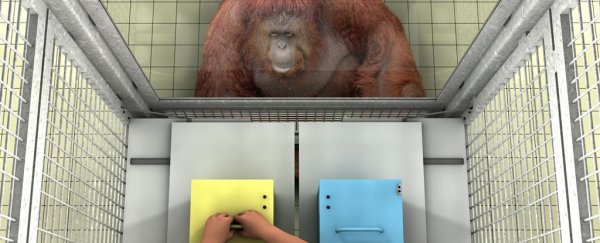Not that you're likely to ever be in a situation where you're gambling with a chimpanzee or orangutan, but if you did sit down to a hand of Texas hold'em with a great ape, it might help to know that they can tell when you hold a belief that probably isn't true.
A recent study has added to a growing pile of evidence indicating that apes know whether another individual has an accurate understanding of a situation, suggesting our closest relatives think more like us than previously believed.
Researchers from the Max Planck Institute for Evolutionary Anthropology in Germany conducted their psychological experiments on a group of 34 chimpanzees, bonobos, and orangutans, all housed in social groups at Leipzig Zoo.
Each ape was trained to open a brightly coloured plastic box that had a clear window built into one side by sliding across a bolt on the box's front.
Under the test conditions, the ape sat facing two boxes – one blue, one yellow – with the window facing them so they could see inside while the experimenter couldn't.
The experimenter would enter the room, sit behind the boxes, and pull out a small orange object for the ape to see; they would then put the object into one of the two boxes, wave goodbye to the ape, and leave the room.
From there, one of two things would happen. The experimenter could walk in with an assistant who would transfer the object from one box to the other while the other person watched, and then lock both boxes.
All the while both the experimenter and their assistant would talk about their actions and pantomime their awareness with gestures and clear facial expressions.
The second scenario was similar, only the person in the experiment waited outside while the assistant 'sneakily' made the swap.
Whether the overt acting made any difference or not isn't clear, but given the same test is conducted on human children the team were keen to keep all of the variables as consistent as possible, just in case.
After the swap was made in both conditions the experimenter stood behind the locked, empty box and tried to open it before shrugging and looking confused.
Trained to be helpful, not to mention eager for a reward, the ape would be left to unlock one of the boxes, which they did about 90 percent of the time.
In three quarters of the trials where the experimenter was out of the room during the swap – a condition defined as false-belief – the apes chose the box with the object in it rather than the box the person was trying to open.
By comparison, the apes unlocked that box only half the time under 'true-belief' conditions, when the experimenter had watched the swap take place.
Based on this, it's easy to assume that the ape goes beyond the obvious facts as they're presented, and makes a guess at what the person wants and believe.
"However, before being able to conclude that they were using an understanding of beliefs to do this, we first need to rule out a possible alternative interpretation of the results that is related to apes' well-documented understanding of others' knowledge/ignorance," the team writes in their paper.
In other words, it's possible the apes simply thought the human didn't know where the object was, which is slightly different to the human mistakenly believing they did know.
That prompted the team to conduct a second experiment on 29 of the original crew of helpful primates six months later.
In this case, the two conditions were divided into "ignorant" – where the experimenter was out of the room when the assistant put an object into one of the boxes – and "false-belief", where the person made it obvious they were watching where the object went before it was swapped behind their back.
Once again, in nearly three quarters of cases, the apes helped by unlocking the box containing the object when the experimenter was expressing a belief that the object was in the wrong box, compared with the 50-50 of unlocking the box when the experimenter simply didn't know.
This study comes just six months after a similar experiment employed an experimenter dressed in an ape-suit 'striking' an assistant before hiding behind a hay-stack, relying on the ape's social instincts to display an understanding of true and false beliefs in others.
Both sets of results support the view that apes have a relatively human-like theory of mind; an ability to 'know that they know'.
"This study shows for the first time that great apes (chimpanzees, bonobos, and orangutans) can use an understanding of false beliefs to help others appropriately," said lead researcher David Buttelmann.
This knack for assessing whether another mind holds a true or false belief is something most humans develop quite young, around the age of 16 to 18 months.
Given we both live in complex societies, not to mention share up to 99 percent of our DNA, and all belonged to the same species up until 11 to 16 million years ago, it's not all that shocking that humans, bonobos, chimpanzees, and orangutans might also have such similar cognitive abilities.
Maybe it's time we just accept them as human; just as long as we don't let them run their own casinos.
This research was published in PLOS One.
